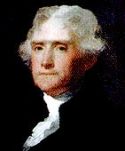Thomas Jefferson
 |
| Order: |
3rd President |
| Term of Office: |
March 4, 1801 - March 4, 1809 |
| Followed: |
John Adams |
| Succeeded by: |
James Madison |
| Date of Birth |
April 13, 1743 |
| Place of Birth: |
Shadwell, Virginia |
| Date of Death: |
July 4, 1826 |
| Place of Death: |
Monticello, Virginia |
| Wife: |
Martha Wayles Jefferson |
| First Lady: |
Martha Jefferson Randolph (daughter)
Dolley Madison (friend) |
| Occupation: |
lawyer, farmer |
| Political Party: |
Democratic-Republican |
| Vice President: |
Aaron Burr (1801-1805)
George Clinton (1805-1809) |
|
Thomas Jefferson (April 13, 1743 - July 4, 1826) was the third
(1801-1809) President of the United States.
His parents were Peter Jefferson (March 29, 1708 - August 17, 1757)
and Jane Randolph (February 20, 1720 - March 31, 1776) both from families
who had settled in Virginia for several generations.
He was the primary author of the Declaration of Independence, and a
source of many other contributions to American culture. Achievements of
his presidency include the Louisiana Purchase and the Lewis and Clark Expedition.
His home in Virginia was Monticello, near Charlottesville, Virginia,
which included automatic doors and other convenient devices that he designed
himself. He helped to found the University of Virginia.
Jefferson's interests included archaeology, a discipline then in its
infancy. He has sometimes been called the "father of archaeology" in recognition
of his role in developing excavation techniques. When exploring an Indian
burial mound on his Virginia estate in 1784, Jefferson avoided the common
practice of simply digging downwards until something turned up. Instead,
he cut a wedge out of the mound, so that he could walk into it, look at
the layers of occupation and draw conclusions from them.
Jefferson was also an avid wine lover and noted gourmet. During his
ambassadorship to France (1784-9) he took extensive trips through French
and other European wine regions and sent the best back to the White House.
He is noted for the bold pronouncement "We could in the United States make
as great a variety of wines as are made in Europe, not exactly of the same
kinds, but doubtless as good." While there were extensive vineyards planted
at Monticello, a significant portion were V. vinifera and did not
survive the many vine diseases native to the Americas. Thus, Jefferson
himself was never able to produce wine on par with Europe. However, it
seems likely that he would be pleased with the quantity and quality of
wine now being made in Virginia.
Jefferson's ideal for the United States was that of an agricultural
nation of yeoman farmers, in contrast to the vision of Alexander Hamilton,
who envisioned a nation of commerce and manufacturing.
Like many landholders of his time, Jefferson owned slaves. A subject
of considerable controversy since Jefferson's own time was whether Jefferson
was the father of any of the children of his slave Sally Hemings.
An electoral tie resulted between Jefferson and his opponentAaron Burr
in the U.S. presidential election, 1800. It was resolved on February 17,
1801 when Jefferson was elected President and Burr Vice President by the
United States House of Representatives.
Jefferson's portrait appears on the U.S. $2 bill.
Sayings
Jefferson on Deism
Jefferson is known for taking a strong independent stance in regards
to religion. He compiled a collection of what he considered to be the most
profound and meaningful passages from the Bible, and published it as an
independent work. This became known as the Jefferson Bible.
Other quotations:
-
"To compel a man to furnish contributions of money for the propagation
of opinions which he disbelieves and abhors is sinful and tyrannical."
-
"The tax which will be paid for the purpose of education is not more than
the thousandth part of what will be paid to kings, priests and nobles
who will rise up among us if we leave the people in ignorance."
Supreme Court appointments
-
William Johnson - 1804
-
Henry Brockholst Livingston - 1807
-
Thomas Todd - 1807
Related articles
External Links